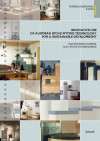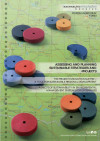Suchergebnisse für "Factsheet: Energietechnologien gestalten, die für alle sinnvoll und nutzbar sind"
IEA Bioenergy Webinar Series: Integration of gasification processes in biorefineries
30. June 2022
Online, AT
A webinar on how gasification technology can be used in existing industries/biorefineries.
Valuable (by-)products of gasification
19. - 20. October 2022
Living Hotel Kaiser Franz Joseph, Sieveringer Straße 4, 1190 Vienna, AT
The workshop will cover topics such as CHP (combined heat and power) / GHG (greenhouse gas) / synthesis products of gasification.
Energy system - Industrial region
Analysis of success factors, restrictions and risks on the development and implementation process caused by the system integration of renewable energy technology in industrial regions with higher energy demand.
Innovative Use Of Austrian Stove Fitting Technology For A Sustainabl Development

Tile stoves in Austria - Clay stoves in Zimbabwe
Forschungsforum
2/2000
Herausgeber: BMVIT
Englisch, 6 Seiten
Downloads zur Publikation
Strategy development for (technical / economical feasibility of) energy autarcic buildings
Development of a strategy for energy autarcic buildings with appropriate Technology solutions.
First passive-house school reconstruction

Factor 10 refurbishment of the General Secondary School II and Polytechnic School of Schwanenstadt (Upper Austria) with prefabricated wooden façade elements and with a comfort ventilation system.
BIGMODERN Subproject 7: Monitoring concept
Development of a pattern for comprehensive documentation of the project results. The concepts contain amongst others monitoring of energy consumption, resources, costs, functionality and comfort, etc.
CICA - Chlorella in circular aquaculture
Project CICA allows the detailed investigation of fish wastewater and its treatment by algae cultivation, as well as the design and construction of a special photobioreactor to purify wastewater and produce fish at the same time.
Kierling passive house - heading into the future sustainably
Using the example of demonstrational renovation, Kierling (built between 1977 and 1979) tests the possibilities of a renovation in passive house standard in technical, organizational and financial terms as an outstanding example of a comprehensive renovation.
CHALLENGE - Highly efficient use of hot gas and waste heat in air/water heat pumps for plus-energy buildings and quarters
CHALLENGE aims to further develop the system concept for air-to-water heat pumps in such a way that they can be used efficiently and without the above mentioned negative effects in densely built-up urban areas. In concrete terms, validated simulations and a functional model of the overall system on a laboratory scale are to be used to demonstrate that the concept can save 10% of electrical energy, reduce the noise of outdoor units in summer to a minimum and prevent the formation of local heat islands.
Secondary Materials in the Austrian Textile Industry - Study with Recommendations for the Austrian R&D-Politics
This study deals with the challenges and potentials for the use of secondary materials in the Austrian textile industry. It identifies challenges and potentials for establishing cycles in the textile industry with a focus on the use of secondary materials in Austria based on broad stakeholder involvement. Based on this, recommendations for research and development activities were formulated to promote recycling.
e80^3-Buildings - "reconstruction concepts towards energy plus house standard with prefabricated active roof and facade elements, integrated home automation and network integration"
The project aims for highly-efficient renovation of existing buildings and settlements in urban areas. The main focus are buildings that were built between 1950 and 1980.
Energy Demand by Households and Household Characteristics
Analysis of private households' energy expenditures and interrelations between socio-economic characteristics and energy consumption
Climate neutrality roadmap St. Veit/Glan
St. Veit/Glan aims at advancing to a beacon for other small Austrian towns by developing strategies, measures and for building the capacity, necessary for achieving climate neutrality by 2040.
Assessing And Planning Sustainable Strategies And Projects

The Project Innovation Matrix - A Tool For Sustainable Regional Development Aspects Of Sustainability In Environmental Management Systems For Enterprises
Forschungsforum
1/2003
Herausgeber: BMVIT
Englisch, 6 Seiten
Downloads zur Publikation
Sanierung PRO!

The goal of the project is the development of a guideline, which supports builders and planners or consultants in the organization and monitoring of inhabitant integration into the reorganization processes of multi-storey housing.
aspern Vienna´s Urban Lakeside - subproject 6a: Energy Consumption Monitoring
This subproject of the flagship project "aspern plus" derived the basis for a centralised monitoring of the energy consumption in Seestadt aspern.
Company communication strategies for sustainability
Based on a representative empirical study among ultimate consumers (1000 interviews) and an empirical survey among 200 model companies in regard to sustainable management, communication strategies and concepts are developed.
smartEXT - extended application boundaries for proven passive house technology
The present study aims to explore the application options for compact units (ventilation devices including micro heat pumps, developed for passive houses) in low energy buildings. Compact ventilation units for heat recovery, heating and domestic hot water shall bear the basic heating load, whereas peak loads shall be covered by newly-developed auxiliary heating equipment combined with intelligent control algorithms. This allows increased energy efficiency as well as cost effectiveness together with higher living quality and lower ecological load.
NATHPRO: Development of NATural fiber High performance pultrusion PROfiles (SUSPRISE Joint Call)
Development of strong, light, weather and heat resistant natural fiber profiles by combining the the advantages of a pultrusion technology with the advantages of natural fibers.
